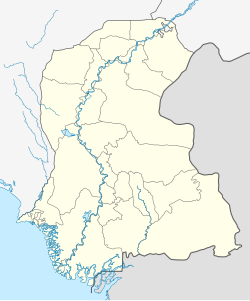Umerkot
Umerkot
Umarkot | |
|---|---|
 The 11th century Umerkot Fort | |
 Umerkot Location of Umerkot | |
| Coordinates: 25°21′47″N 69°44′33″E / 25.36306°N 69.74250°ECoordinates: 25°21′47″N 69°44′33″E / 25.36306°N 69.74250°E | |
| Country | |
| Province | |
| Division | Mirpur Khas |
| District | Umarkot |
| Metropolitan Corporation | Pre-islamic Hindu-era |
| Government | |
| • Deputy Commissioner | Nadeem Ur Rehman Memon |
| Area | |
| • City | 48.6 km2 (18.8 sq mi) |
| Population | |
| • City | 134,052 |
| • Rank | 68th, Pakistan |
| • Density | 2,800/km2 (7,100/sq mi) |
| Time zone | UTC+05:00 (PKT) |

Umerkot[a] (Urdu: عمركوٹ; Dhatki and Sindhi: عمرڪوٽ) formerly known as Amarkot,[2] is a city in Umerkot District in the Sindh province of Pakistan. The City Was Named After Rana Amar Singh. This place earlier was ruled by Sodha Rajputs of the Parmar Clan who were the Founders of this place.
The local language is Dhatki, which is one of the Rajasthani languages of the Indo-Aryan language family. It is most closely related to Marwari. Sindhi, Urdu and Punjabi are also understood by the citizens.
Etymology[]

The city is named by its Hindu founder Maharaja Amar Singh,[3] who originally built the Amarkot Fort here.[3] The name of the city was later changed after a local Ruler of Sindh Umer Soomro of the Umar Marvi story which also appears in Shah Jo Risalo and is one of the popular tragic romances from Sindh.[3]
History[]
Umerkot province was ruled by the Sodha Rajput clan of Hindu Rajputs during the medieval time period.[4] Rana Parshad, the Sodha Rajput ruler of Umarkot, gave him refuge.[5] Later on, Akbar brought northwestern India, including modern day Pakistan under Mughal rule.
After the disintegration of the Mughal empire, Umerkot was captured by several regional powers including the Perisans, Afghans, Kalhora and Talpura Baloche's of Sindh, Rathore Rajputs of Jodhpur and finally by the British.[6]
Umerkot was annexed by Jodhpur State in 1779 from the Kalhora Nawab of Sindh[7] Umerkot and its fort was later handed to the British in 1847 by the Maharaja of Jodhpur in return for reducing the tribute imposed on Jodhpur State by Rs.10,000.[8]
Its ruler Rana Ratan Singh was hanged by the British at this fort for standing up for the rights of the Sindhis. Rana Chandra Singh, a federal minister and the chieftain of the Hindu Sodha Thakur Rajput clan and the Umerkot Jagir, was one of the founder members of Pakistan Peoples Party (PPP) and was elected to the National Assembly of Pakistan from Umarkot, seven times with PPP between 1977 and 1999, when he founded the Pakistan Hindu Party (PHP).[9][10] Currently, his politician son Rana Hamir Singh is the 26th Rana of Tharparkar, Umarkot and Mithi.[11][12]
Points of interest[]
The city is well connected with the other large cities like Karachi, the provincial capital and Hyderabad.[13]
Umarkot has many sites of historical significance such as Akbar's birthplace, Umarkot, Umerkot Fort and Momal Ji Mari.
There is an ancient temple, Shiv Mandir, Umerkot, as well as a Kali Mata Temple, Krishna Mandir at old Amarkot and at Rancho Line.
Folklore[]
The story of Umar Marvi is that Marvi was a young Thari girl abducted by then-ruler, Umar, who wanted to marry her because of her beauty. Upon her refusal, she was imprisoned in the historic Umerkot Fort for several years. Because of her courage, Marvi is regarded as a symbol of love for one's soil and homeland.
Education[]
The city has more than 100 schools, 20 colleges, and one polytechnic college.
Religions[]
The Umarkot Shiv Mandir in here is one of the most ancient and sacred Hindu temple in the Sindh Hindus: 52% Muslims:47% Others:1%[14]
See also[]
Gallery[]
Umerkot Fort
Umerkot Museum
Notes[]
- ^ Also spelled as Umarkot.
References[]
- ^ "PAKISTAN: Provinces and Major Cities". PAKISTAN: Provinces and Major Cities. citypopulation.de. Retrieved 4 May 2020.
- ^ Historical Forts in Pakistan
- ^ a b c Shaikh Khurshid Hasan (1 January 2005). Historical Forts In Pakistan. National Institute of Historical & Cultural Research Centre of Excellence, Quaid-i-Azam University. ISBN 978-969-415-069-7.
- ^ Part 10:..the birth of Akbar Humayun nama by Gulbadan Begum.
- ^ Part 10:..the birth of Akbar by Gulbadan Begum.
- ^ https://researcharchive.vuw.ac.nz/xmlui/bitstream/handle/10063/8776/thesis.pdf?sequence=1
- ^ https://researcharchive.vuw.ac.nz/xmlui/bitstream/handle/10063/8776/thesis.pdf?sequence=1
- ^ "Imperial Gazetteer2 of India, Volume 14, page 186 -- Imperial Gazetteer of India -- Digital South Asia Library".
- ^ "Hindu Leader, Ex-minister Chardar Singh is Dead". Khaleej Times. 3 August 2009. Archived from the original on 8 June 2011. Retrieved 3 August 2009.
- ^ Guriro, Amar (2 August 2009). "Chieftain of Pakistani Hindu Thakurs dies". Daily Times. Retrieved 2 August 2009.
- ^ Footprints: Once upon a time in Umerkot, Dawn (newspaper), 16 January 2015.
- ^ Pakistan's Umerkot gets a new Hindu ruler, The Hindu, 30 May 2010.
- ^ "Archived copy". Archived from the original on 24 February 2012. Retrieved 16 February 2014.CS1 maint: archived copy as title (link)
- ^ https://www.dawn.com/news/1392074. Retrieved 18 February 2021. Missing or empty
|title=(help)
External links[]
| Wikimedia Commons has media related to Umerkot. |
| Wikivoyage has a travel guide for Umerkot. |
- Umerkot
- Hindu communities of Pakistan
- Hinduism in Sindh



